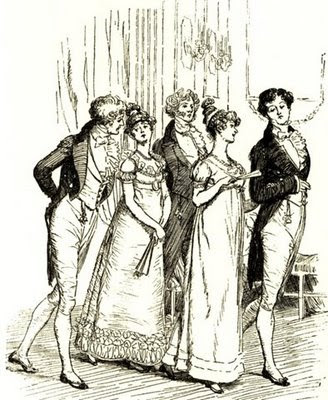
I am now ten chapters into Pride and Prejudice, and it is good to know that Mr. Darcy would approve a venture to read such vast amounts of literature. I figured that since I am now well established in the novel, I should provide a bit of an introduction to the next work. But before I do, here is another delightful quote to get you acquainted with the style of the book.
"In a few days Mr Bingley returned Mr Bennet's visit, and sat about ten minutes with him in his library. He had entertained hopes of being admitted to a sight of the young ladies, of whose beauty he had heard much; but he only saw the father. The ladies were somewhat more fortunate, for they had the advantage of ascertaining from an upper window, that he wore a blue coat and road a black horse." (Chapter 3)
Pride and Prejudice is was published in 1813, and is generally regarded as the most popular or well known of Jane Austen's major works. It was originally titled First Impressions, a title that fit the novel well, but the name did not suite the publisher, and it was re-titled. It is an ironic novel that mocks and celebrates the intricacies of 19th century British culture. This novel not only gives the modern reader a good batch of romance, but also serves as an excellent picture of Regency lifestyle. To fully appreciate it, you must begin reading it with the understanding that it was written to be humorous and satirical.
It follows the life of the Bennet family, and while it has its deeper scenes, is generally a light-hearted book. The Bennets have five unwed daughters, and because their estate is entailed to a male cousin, there is tremendous pressure on Mrs Bennet's part to see all of her girls well married. The book also unfolds the romance of the mysterious and famous Mr Darcy and the witty heroine, Elizabeth Bennet. The text is very quotable, and features more dialogue than say, Sense and Sensibility. I want to share so many quotations, because every other phrase is worthy of its own blog post. For your convenience, and my sanity, I will refrain from such an endeavor.
One of the most famous Jane Austen quotations comes from the opening lines of Pride and Prejudice. "It is a truth universally acknowledged, that a single man in possession of a good fortune, must be in want of a wife." (Chapter 1) This quotation is often parodied by Janeites and scholars alike. Since I am taking the time to blog about all her novels, I figure that I am qualified to give it a go: "It is a truth universally acknowledged, that a single girl, without the possession of a large fortune, might be enticed to read vast amounts of classical English literature. " (Julia de Boer, Reading Through Austen, 2011 !)
I am finding that in rereading familiar scenes, new, witty insight can be found. For example, while reading this time, I am have been flipping to the back of the book to read the footnotes. One in particular caught my attention. In this chapter, Elizabeth, Mr Darcy, Mrs Hurst, and Miss Bingley are out walking on the Netherfield estate. The two other women cut Elizabeth off, leaving no room for her to walk with them on the path. Although Mr Darcy amiably offers to switch to a larger path, she does not find enjoyment in their company, and decides to return to the great house. She says, " ' No, no; stay where you are. - You are charmingly group'd and appear to uncommon advantage. The picturesque would be spoilt by admitting a fourth. Goodbye.' " (Chapter 10) It turns out that "admitting a fourth" refers to an article published by an artist of the time, named Gilpin. The article explained how to picturesquely draw cattle in a field, and said that three was the ideal number, but that by adding a fourth, or subtracting one, the effect would be lost. It can be assumed that Elizabeth knew of this, and therefore, indirectly called all of them cows! They were likely affronted. But imagine a society where, in referencing an artist, one could call a group of the aristocracy a bunch of cows. I find the wit of Jane Austen amusing, and I wish that I could have met her.
Hi Julia,
ReplyDeleteOK - so this whole idea of leaving a comment on your blog just isn't working for me.
I haven't yet managed to submit a comment.
So, check out this link:
http://librivox.org/newcatalog/search.php?reader=&mc=&bc=&cat=&genre=&language=&type=&author=&title=&status=complete&reader_exact=&mc_exact=&bc_exact=&date=&group=&engroup=&ingroup=&offset=240
Yes, yes. I know its a long link. But its where you can go to listen to Jane's books. Nothing like doing school reading and knitting at the same time.
Love, Tante Margo